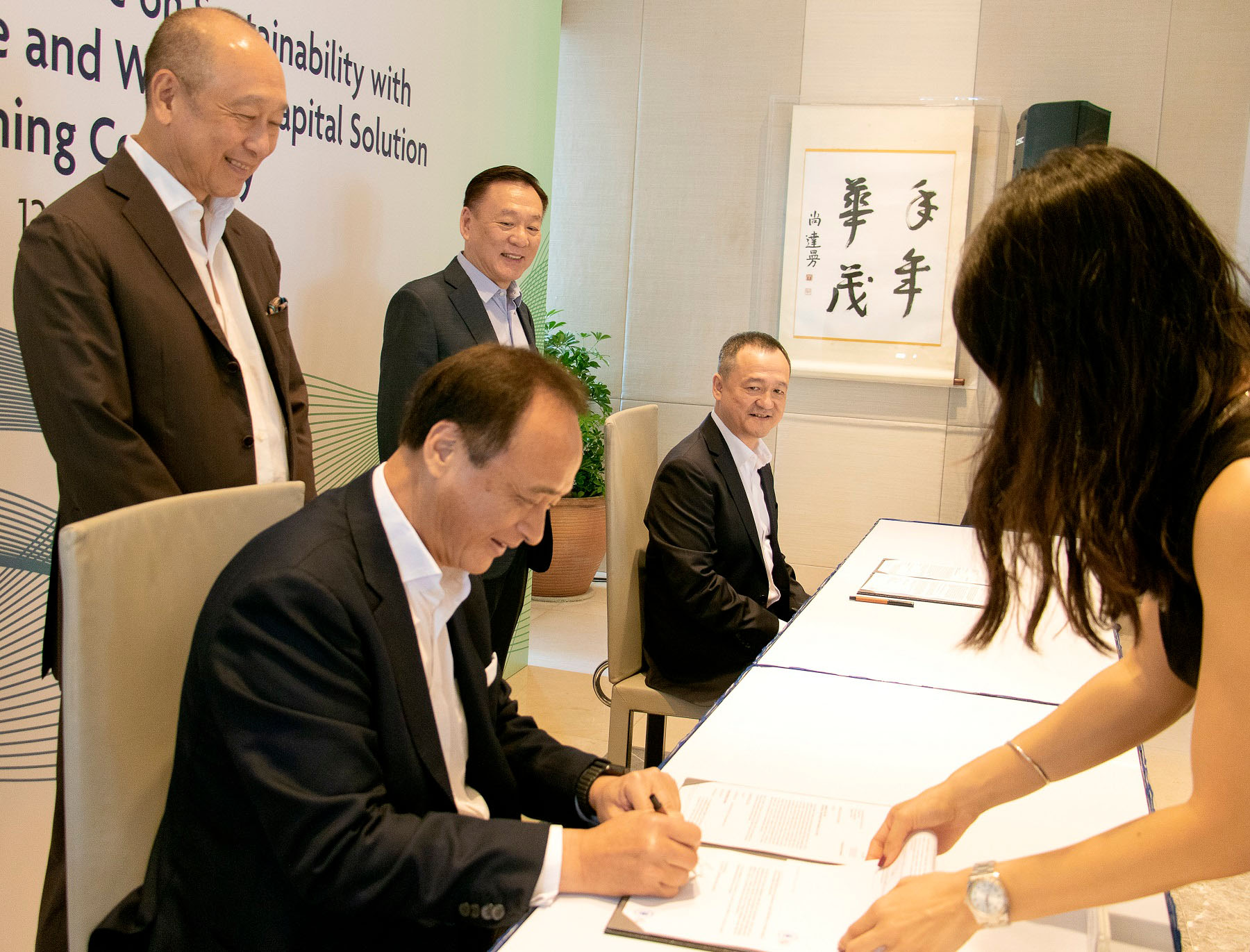
UOB and Musim Mas collaborate on a green trade finance facility under the new Green and Sustainable Trade Finance and Working Capital Framework. The facility granted by UOB will help Musim Mas build on their current sustainability initiatives and increase their supply chain resilience. (L to R) Mr Frederick Chin, Head of Group Wholesale Banking and Markets, UOB; Mr Wee Ee Cheong, Deputy Chairman and CEO, UOB; Mr Lim Ek Tjioe, Group Executive Chairman and CEO, Musim Mas; Mr Alvin Lim, Group Finance Executive Director and CFO, Musim Mas
UOB today announced that it has extended its first green trade finance facilities under the Green Finance Industry Taskforce’s Green and Sustainable Trade Finance and Working Capital Framework. The facilities will help two of the Bank’s clients in Singapore’s food supply chain build on their sustainability initiatives and strengthen their supply chain resilience. The clients are Musim Mas Group1, a global leader in the merchandising and distribution of palm oil and its derivative products, and Barramundi Group Pte Ltd2, an aquaculture company.
In order to qualify for green trade financing, companies must have a clear sustainability strategy and provide documents that show how the funds will be used. They also need to submit records that demonstrate the positive sustainability outcomes from their business activities or trades related to the green trade financing.
Mr Frederick Chin, Head of Group Wholesale Banking and Markets, UOB said, “As part of forging a sustainable future, we are actively engaging our clients to reinforce the importance of sustainability to their business. To that end, we have been sharing our expertise on how they can use sustainable finance products and solutions to ramp up their sustainability drive simply and effectively. Our collaborative approach helps to drive greater market adoption for green financing and encourages more businesses to advance responsibly.
“Companies that qualify for a green trade financing facility have taken steps to mitigate their environmental, social and governance risks such as identifying suppliers with good overall management practices and building more resilient supply chains. They are also at the forefront of an industry megatrend. There is more than S$1 trillion worth of trade that flows through Singapore3, of which more than S$90 billion meets the requirements of being green and sustainable. These trade flows provide an immense opportunity for us to work with companies to offer green trade financing and to support their trade flows through our regional network capabilities.”
Working with clients to increase the resilience of food supply chains
The green trade finance facilities extended to the Musim Mas Group will be channelled towards supporting their working capital needs, in particular its sourcing of certified palm oil from responsible suppliers. The palm oil giant whose activities range from plantations to production of consumer goods such as cooking oil and personal care products, is a front-runner when it comes to incorporating sustainability into their corporate agenda. Apart from significantly reducing greenhouse gas emissions through activities such as the installation of methane capture facilities, the Group is also known for its smallholder4 programme which helps smallholder farmers produce palm oil sustainably.
Mr Alvin Lim, Group Chief Financial Officer, Musim Mas said, “At Musim Mas, sustainability is at the core of everything we do and we firmly believe that doing good for the environment and society translates into positive returns for the business. UOB has been actively supporting our financial needs and reached out to us on the opportunity to use green trade financing to accelerate our sustainability agenda, such as in our procurement of certified sustainable palm oil. We will continue to work with responsible suppliers and business partners in different areas of our business and in doing so, we also hope to raise awareness of the benefits of going green and encourage others to adopt more sustainable business practices.”
The Bank also supported Barramundi Group in furthering its sustainability initiatives to contribute to greater resilience and security in the seafood ecosystem. Barramundi Group, a leading barramundi aquaculture company, is expanding its sustainability initiatives to support Singapore’s “30 by 30” vision – to produce 30 per cent of Singapore’s nutritional needs locally by 2030. To do so, it has obtained green trade and working capital facilities from UOB for sourcing of sustainable raw materials as part of its adoption of innovative solutions such as using climate-resilient and sustainable technologies.
Mr Andreas von Scholten, Chief Executive Officer, Barramundi Group said, “Since 2017, we have been working closely with UOB on the financial solutions that best suit the needs of our company. Transitioning the relatively traditional aquaculture industry to a path of sustainability comes with its challenges. However, with the support of the green trade finance facility granted by UOB, we are able to inject more funds into accelerating the deployment of technologies that will help make fish rearing more sustainable. We look forward to the continued collaboration with UOB and together, we can contribute towards strengthening Singapore’s food security.”
1 Musim Mas Group is one of the world’s largest, integrated palm oil corporations with operations spanning the entire value chain across the Americas, Europe and Asia. Headquartered in Singapore the company produces palm oil products and derivatives across multiple industries worldwide.
2 Barramundi Group Pte Ltd is a global aquaculture company with operations in Singapore, Australia and Brunei. The company grows, process and markets their own registered brands of sustainably-grown, ocean-farmed Barramundi.
3 Source: Singapore International Trade, total merchandise trade at current prices 2016 – 2020, Singstat. https://www.singstat.gov.sg/modules/infographics/singapore-international-trade
4 Oil palm smallholders are farmers with less than 25 hectares of planted oil palm. On average, smallholders manage about two hectares per household and they form approximately 40 per cent of Musim Mas’ supply base.




